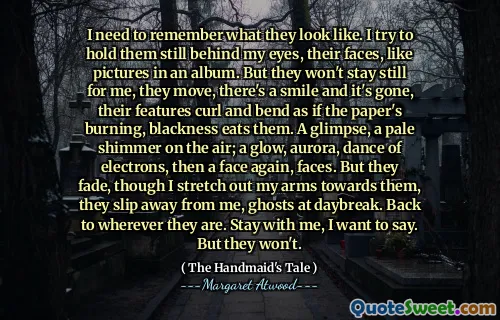Don't let them suffer too much. If they have to die, let it be fast. You might even provide a Heaven for them. We need You for that. Hell we can make for ourselves.
In Margaret Atwood's "The Handmaid's Tale," the quote emphasizes a compassionate perspective on suffering and death. The speaker suggests that if a person must face death, it is better for it to be quick and painless rather than prolonged. This reflects a desire to ease the pain of those who are suffering, advocating for a humane approach to mortality.
The quote also contrasts the ideas of Heaven and Hell, implying that we have the power to create our own Hell through our actions and experiences. It suggests a reliance on a higher power to provide solace or a better afterlife, reinforcing the theme of hope amidst despair. Ultimately, it calls for empathy and the importance of easing suffering in others.






